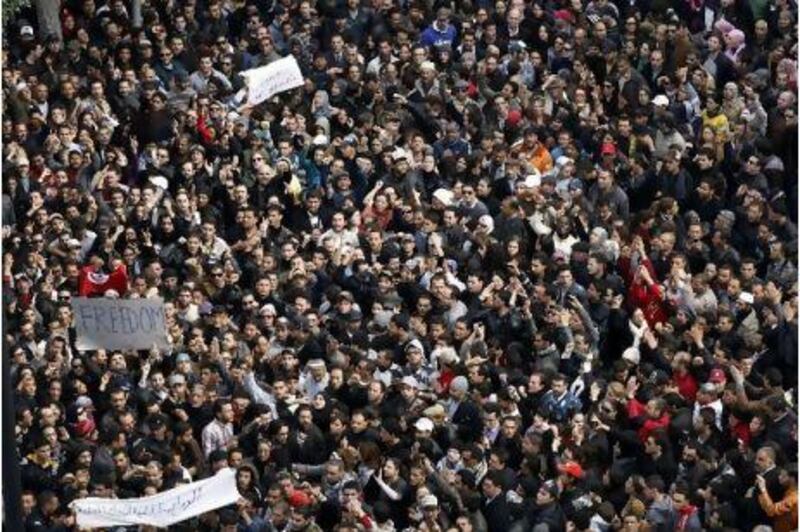TUNIS // Tunisia's president, Zine el Abidine Ben Ali, stepped down from his post and left the country last night after weeks of escalating street protests and a rising clamour for him to step down.
Mr Ben Ali's destination was not immediately known, said Agence France-Presse, which reported the president's departure.
The prime minister, Mohammed Ghannouchi, said late last night that he would replace Mr Ben Ali on an interim basis.
"I vow that I will respect the constitution and implement the political, economic and social reforms that have been announced … in consultation with all political sides including political parties and civil society," Mr Ghannouchi said.
Mr Ben Ali's departure culminated a dizzying 24 hours during which he stepped back from blaming foreign terrorists and previous pledges to crack down on protesters.
The 74-year-old leader promised instead not to challenge a constitutional age limit of 75 for presidents, called for new legislative elections and ordered a lifting of the government's tight censorship of the media and the internet.
"I am telling you I understand you, yes, I understand you," Mr Ben Ali said on Thursday night in a nationally televised address.
None of these measures, however, defused the growing street protests and demands for an immediate end to his 23 years in power. Less than an hour before Mr Ghannouchi's announcement, Mr Ben Ali imposed a state of emergency across the country and dismissed his cabinet.
Yesterday, police in the centre of Tunis fired tear-gas canisters and charged with batons to disperse thousands of protesters angry about unemployment and corruption.
The Tunisian people "have the right to choose their leaders", the White House said. Mike Hammer, the National Security Council spokesman, said the White House had seen the reports that Mr Ben Ali had left Tunisia.
Crowds fled down the city's main boulevard as police advanced to the thud of tear-gas cannons, clubbing some people. Within minutes, the street was empty save for police marching beneath a haze of gas.
Authorities announced a ban on public gatherings and imposed a 14-hour curfew from 5pm, saying police had the right to fire on anyone refusing to obey orders.
Shots rang out in the Tunisian capital despite the curfew, shortly after an announcement that veteran Mr Ben Ali had quit, AFP reported.
The army meanwhile took control of the main international Tunis Carthage airport and airspace was shut down, an airport source told AFP.
One of Europe's biggest tour operators, Thomas Cook, said it was evacuating 1,800 British and Irish holidaymakers. The operator said three flights from the resort of Monastir had landed in Britain and it was pressing ahead with three more despite officials saying that the country's airspace had closed.
On Thursday, Mr Ben Ali promised Tunisians free media and the right to demonstrate peacefully, and pledged not to remove presidential age limits that bar him from re-election in 2014.
Such concessions, plus Mr Ben Ali's decision yesterday to sack ministers and call for early elections, signal that he had been scrambling to appease protestors, said J Scott Carpenter, a Tunisia expert at the Washington Institute for Near East Policy, a foreign affairs think-tank in Washington.
However, the crisis brought Mr Ben Ali's 23-year rule to an abrupt end.
The inability of security services to contain protests that spread from Tunisia's heartland to the capital left Mr Ben Ali politically weakened, Mr Carpenter said.
While it is unclear what will happen next, Mr Ben Ali's political machine, the Constitutional Democratic Rally party, is likely to coalesce around a regime stalwart, he said.
Protests began last month when an impoverished vegetable seller in the rural town of Sidi Bouzid set himself on fire after authorities confiscated his produce. In recent days, anger over unemployment and corruption has swelled into calls for Mr Ben Ali's departure.
Yesterday morning, thousands gathered outside the interior ministry in central Tunis demanding that Mr Ben Ali resign, waving placards and chanting: "Free Free Tunisia Tunisia, Out Out Ben Ali."
The film festival organiser Hisham Ben Khamsa, one of yesterday's protesters, said: "I feel the way I think my father felt on the eve of our independence from France in 1956."
While Tunisia's economy has grown in recent years and living standards often approach those in Western Europe, the country suffers a 14 per cent official unemployment rate that is most acute among young people and in the countryside.
Mr Ben Ali has promised to create 300,000 jobs for graduates in the next two years and said that the government will investigate claims of corruption.
Belhacen Louati, 30, an intern at the social affairs ministry helping lead pro-Ben Ali marchers in Tunis on Thursday night, said: "I'm with Ben Ali. Our country is advancing, step-by-step."
"You in Tunis don't know the south, where I'm from," cut in Reda Maamri, 28, a jobless graduate in marketing from the mining town of Gafsa. "We're eight in my family, my father's retired, and I've been seeking work for six years."
The conversation was a rare instance of public debate over politics in Tunisia.
Thikra, 26, a student demonstrating in central Tunis yesterday, said: "I have no confidence in Ben Ali. He bears responsibility for the dead protesters. And dissidents are still in jail."
While Mr Ben Ali said on Thursday that police will no longer use live ammunition against protesters, authorities have said the 23 have died so far in clashes with the police.
Union officials have put the number at around 50 and the Paris-based International Federation for Human Rights at 66. Authorities say police have only used force in self-defence, or to protect lives and public property.





